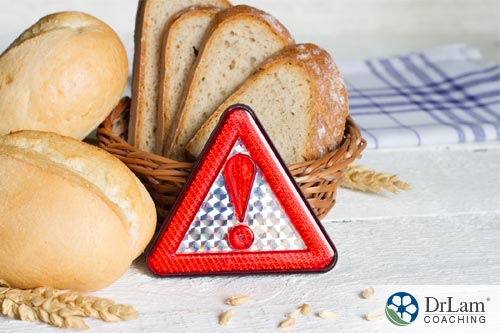 All-purpose white flour essentially turns to sugar in your belly, and it is full of gluten. But if you are looking for a healthier way to make your favorite baked goods, in most cases you can substitute all-purpose white flour with almond flour. You just have to add more binding agent, such as eggs, protein powder, flaxseeds, or ground psyllium husk powder. The substitution works on a one to one basis: equal amounts of almond flour for the same quantity of all-purpose flour. And a great way to get started with almond flour is these almond flour muffins. They taste divine!
All-purpose white flour essentially turns to sugar in your belly, and it is full of gluten. But if you are looking for a healthier way to make your favorite baked goods, in most cases you can substitute all-purpose white flour with almond flour. You just have to add more binding agent, such as eggs, protein powder, flaxseeds, or ground psyllium husk powder. The substitution works on a one to one basis: equal amounts of almond flour for the same quantity of all-purpose flour. And a great way to get started with almond flour is these almond flour muffins. They taste divine!
A good reason to consider an almond flour muffin instead of a regular flour is that gluten is affecting more and more people on a daily basis. Our grandparents and great-grandparents never seemed to have the health issues we have today. The reason for this may be a relatively simple one.
Gluten is a combination of two proteins found in the majority of grains, such as rye, wheat, and barley. These proteins are termed ‘sticky’ proteins because they hold a plant’s stored nutrients together. It is this sticky property of gluten that makes it such a great choice of binder or filler in most of the processed foods we eat. The proteins in gluten are the peptides glutenin and gliadin. But here comes the problem.
The grains we eat these days have been modified to become insect and drought resistant. They have also been hybridized to yield larger crops in a shorter period. As a result of this interference, many grain products now have new proteins. These proteins did not naturally occur in these crops before. These new proteins may lead to systemic inflammation – and gluten intolerance.
To add insult to injury, the grains we grow today have also become what is known as "deamidated." This means that they are now water soluble, and they can be found in just about any kind of packaged food you can think of. This deamidation may also elicit an immune response that could potentially devastate the health of someone with adrenal fatigue or some form of gluten intolerance by overtaxing an already overburdened body. The end result may be an adrenal crash that could potentially take months, if not years, to recover from.
As the name implies, almond flour is made of almond nuts that have been ground so finely that they take on a flour-like consistency. It is usually favored by those who are gluten sensitive or have celiac disease, or by people who are on a low-carbohydrate diet.
Although almond flour is available in many stores, you can also make your own by grinding up the needed amount of almonds in your food processor.
Almond flour muffins are a great treat for anyone who suffers from some form of gluten intolerance. Celiac disease is probably the most severe form of this condition. People with gluten intolerance usually have an adverse reaction to gluten, which is commonly found in barley, rye, and wheat. Celiac Disease affects roughly one percent of the American population and may lead to digestive issues. Up to 13 percent of people, however, may have a milder form of gluten intolerance. Even here, though, certain symptoms may manifest. And many of the symptoms may not have anything to do with digestion.
Common symptoms associated with gluten intolerance include:
Depression and digestive issues, as well as the other symptoms mentioned, may also be symptoms relating to adrenal fatigue. In fact, autoimmune conditions such as gluten intolerance may themselves be symptoms of adrenal fatigue. Gluten intolerance, depression, and adrenal fatigue are often linked.
Stress can lead to adrenal fatigue, which weakens the gut, worsens gluten intolerance, and can influence neurotransmitters that control feelings of depression.
Adrenal fatigue is a condition that sees your adrenals, as well as your different body systems, becoming compromised due to stress. Although people seem to think of stress as being psychological in nature, the truth is that your body can experience stress not only because of psychological reasons, such as a very demanding job, but due to environmental and physiological factors as well.
 Once your brain notes stress, the hypothalamic-pituitary-adrenal (HPA) axis comes into play. Here, the hypothalamus in the brain sends chemical messengers (neurotransmitters) to the pituitary gland which, in turn, sends chemical messengers to the adrenal glands, instructing them to produce more cortisol and adrenaline. Cortisol and adrenaline are responsible for your body’s “fight or flight” response. During this time, more sugar is released for energy, your heart rate increases, and all body processes not deemed necessary for immediate life are either shut down or slowed down. This process is commonly referred to as your NeuroEndoMetabolic (NEM) Stress Response.
Once your brain notes stress, the hypothalamic-pituitary-adrenal (HPA) axis comes into play. Here, the hypothalamus in the brain sends chemical messengers (neurotransmitters) to the pituitary gland which, in turn, sends chemical messengers to the adrenal glands, instructing them to produce more cortisol and adrenaline. Cortisol and adrenaline are responsible for your body’s “fight or flight” response. During this time, more sugar is released for energy, your heart rate increases, and all body processes not deemed necessary for immediate life are either shut down or slowed down. This process is commonly referred to as your NeuroEndoMetabolic (NEM) Stress Response.
The NEM is a perfectly normal response and, under normal conditions, does no harm. However, continuous stress sees this process carry on, sometimes indefinitely. The consequences under these circumstances could be devastating. Aside from adrenal fatigue, this process could also worsen gluten intolerance.
Adrenal fatigue has well-known associations with hormone imbalances and dysbiosis in the gut, an imbalance of good and bad bacteria. This destabilizing of the gut, where neurotransmitters are made, can further weaken your body’s ability to deal with gluten, and influence your mental wellbeing as well.
A good reason to consider making almond flour muffins is that gluten, according to various studies, may have psychological effects in certain people. Gluten, for instance, may result in abnormal serotonin levels. Serotonin is commonly referred to as a hormone that creates feelings of happiness. It is also one of your brain’s neurotransmitters. Lower serotonin levels have been linked to depression, which is why SSRI’s (Selective Serotonin Reuptake Inhibitors) are often used to treat depression.
Besides depression, gluten has also been linked to instances of mood disorders, anxiety, autism spectrum disorders, schizophrenia, and Attention-Deficit Hyperactivity Disorder (ADHD).
So if you have adrenal fatigue or gluten intolerance, or live in the modern world where both are becoming increasingly common, knowing how to cook with almond flour can be a good thing.
This recipe makes individual almond flour muffins and is great for those living the single life or in need of a quick and simple breakfast.
 This is a basic recipe. You could add numerous different ingredients to this recipe for a variety of almond flour muffins. Cheese, frozen berries, and even nuts are all good additions. Please note, however, that you may need to increase your cooking time slightly.
This is a basic recipe. You could add numerous different ingredients to this recipe for a variety of almond flour muffins. Cheese, frozen berries, and even nuts are all good additions. Please note, however, that you may need to increase your cooking time slightly.
Do remember though, that just like anything else taken to the extreme, too many almonds in your diet, in whatever shape or form, could potentially be harmful. The possible side effects of consuming too many almonds include gastrointestinal issues like constipation, diarrhea, and bloating; a vitamin E overdose resulting in headaches, blurred vision, flatulence, and lethargy; possible weight gain due to being relatively high in calories; and interactions with certain medications due to the high levels of manganese that could potentially interfere with certain drugs like blood pressure medications and laxatives. In ordinary quantities and for most people though, almonds are fine.
To eat or not to eat those almond flour muffins? If you have Celiac disease or gluten intolerance, the answer is a most resounding YES! But almond flour muffins are also a great treat for those who have no issue with gluten. They are bursting with vitamins, minerals, and antioxidants that can only do your body good in the long run.
Overall and eaten in sensible quantities, almond flour is a great, simple alternative to the sugary, gluten-heavy flour so many people are developing issues with.
© Copyright 2019 Michael Lam, M.D. All Rights Reserved.
Yes, these almond flour muffins are a healthier alternative, not only for those with gluten intolerance but even for those with diabetes or gut issues. There are only three ingredients, and you can add additions of your choice, such as blueberries, cheese, or nuts.
